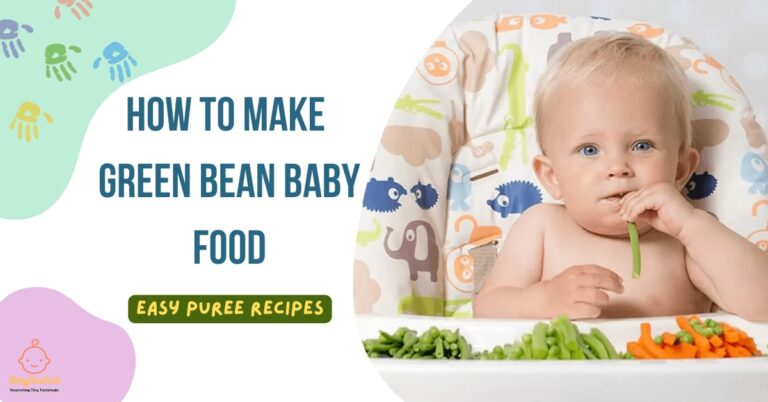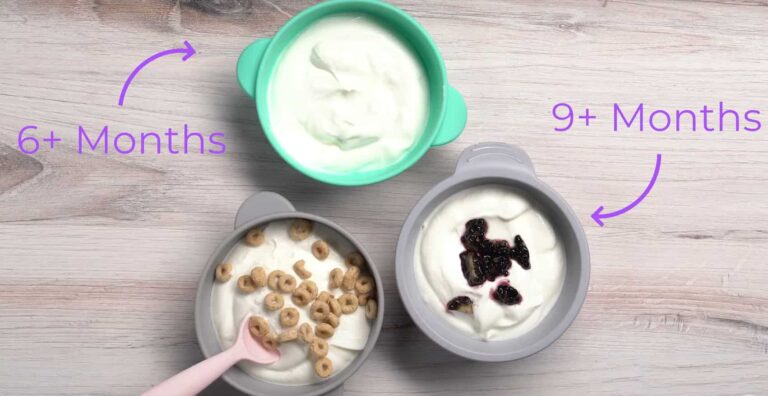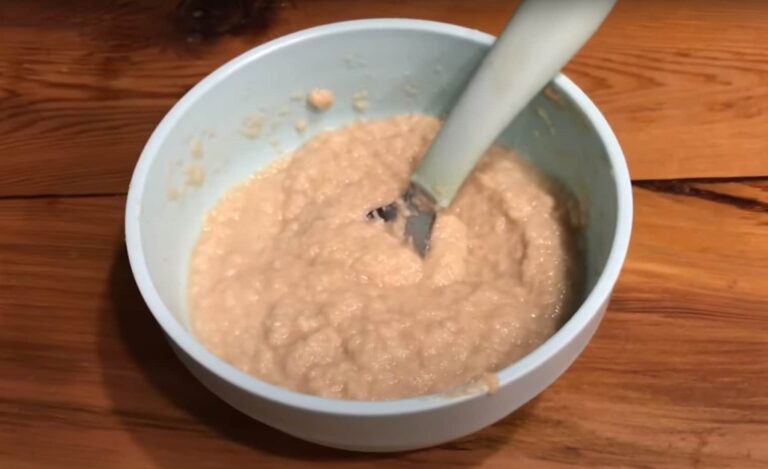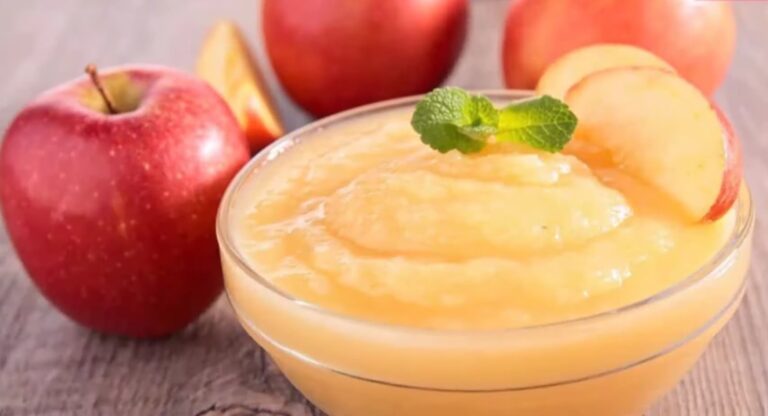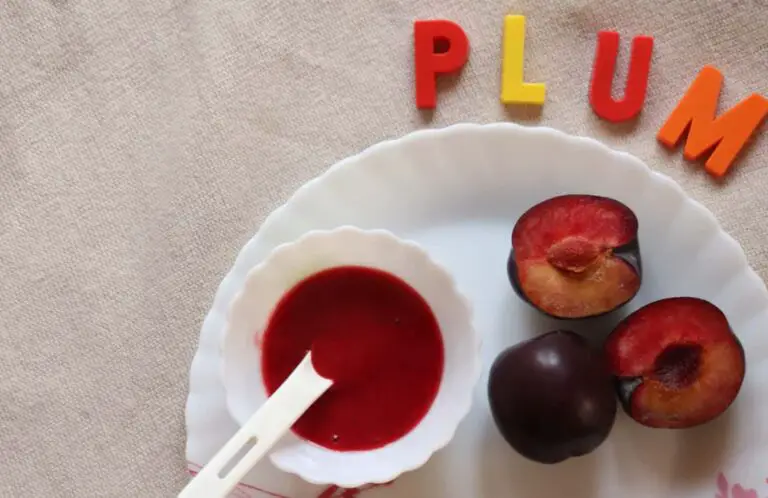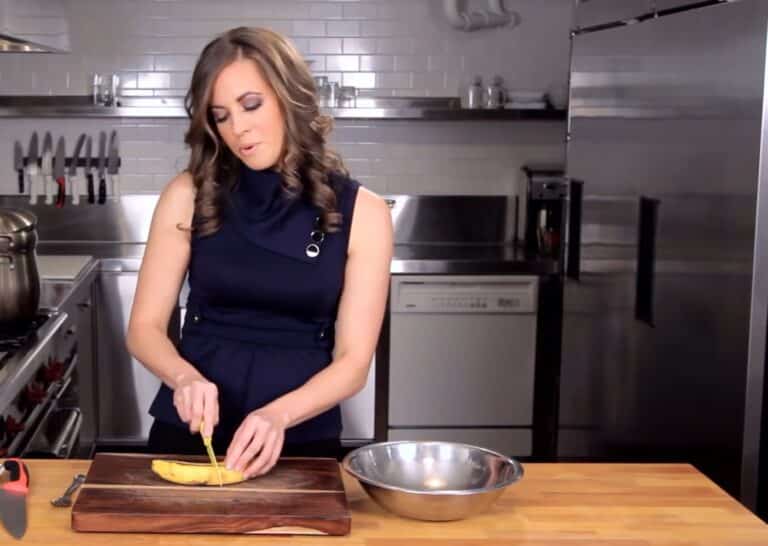Carrot puree for 6 month baby
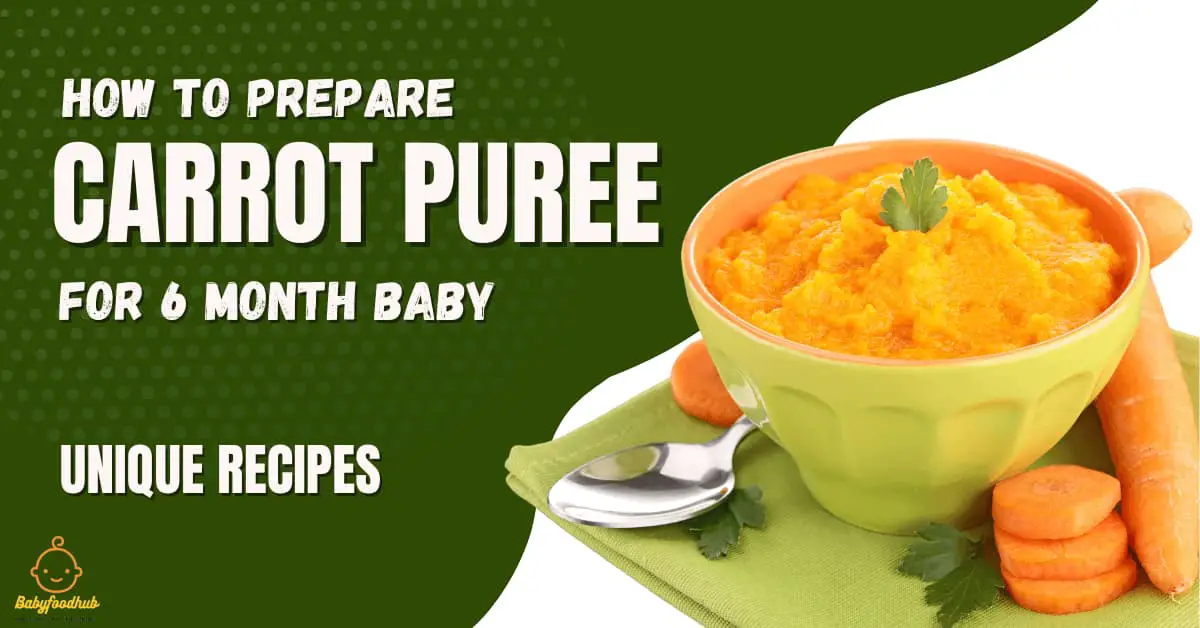
Carrot puree is a nutritious and safe option for a 6-month-old baby. It is rich in vitamins and minerals, easy to digest, and can be introduced as one of their first solid foods.
Carrots are a great source of beta-carotene, which is important for the baby’s eyesight and overall growth and development. Pureeing the carrots helps make them soft and smooth, making it easier for the baby to consume. It is important to cook the carrots until they are tender before pureing them.
Start by steaming or boiling the carrots, then blend them into a smooth consistency using a blender or food processor. Introduce the puree gradually, starting with small portions and gradually increasing the quantity as the baby gets used to the taste and texture.
Benefits Of Carrot Puree For 6 Month Baby
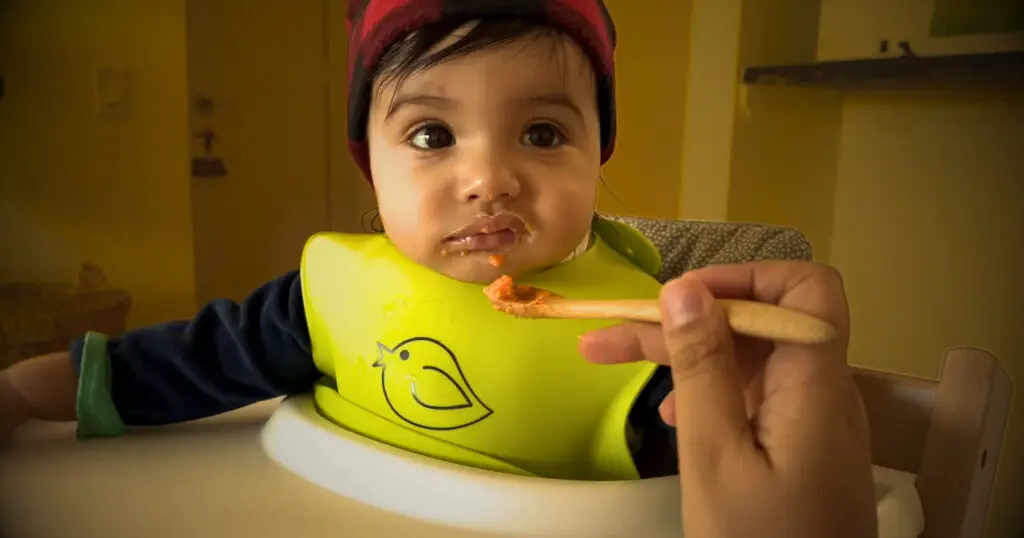
Introducing carrot puree to a 6-month-old baby can provide numerous benefits, as it is packed with essential vitamins and minerals for their development and growth. Its smooth texture and mild taste make it a perfect choice for introducing solid foods to your little one.
Carrot puree is not only a tasty treat for your little ones but also a great way to introduce them to the world of solid foods. Packed with essential nutrients, carrot puree offers numerous benefits for your 6-month-old baby. Let’s explore some of the key benefits of introducing carrot puree:
Nutritional Value Of Carrots For Babies
- Rich in beta-carotene: Carrots are loaded with beta-carotene, which is converted into vitamin A in the body. Vitamin A is essential for healthy vision, immune function, and growth.
- Source of fibre: Carrots contain dietary fibre, which aids in digestion and helps prevent constipation in babies.
- Antioxidant properties: Carrots are known for their high antioxidant content, which helps protect the body’s cells from damage caused by harmful free radicals.
- Essential vitamins and minerals: Carrots are a good source of vitamins C, E, and K, as well as minerals like potassium, calcium, and phosphorus. These nutrients contribute to overall growth and development in babies.
Key Benefits Of Introducing Carrot Puree
Boosting the immune system:
- Vitamin A boost: Carrots’ high vitamin A content helps strengthen the immune system, making it more resilient against infections and diseases.
- Antioxidant defence: The antioxidants found in carrots play a vital role in supporting the immune system by neutralizing harmful free radicals and reducing oxidative stress.
Enhancing eye health:
- Good for vision: Carrots contain beta-carotene, which is converted into vitamin A in the body. Vitamin A is essential for developing and maintaining good vision in babies.
- Protection against eye disorders: The antioxidants in carrots, such as lutein and zeaxanthin, help protect the eyes from age-related macular degeneration and other eye disorders.
Incorporating carrot puree into your baby’s diet not only offers a nutritious start to their solid food journey but also provides a host of health benefits. The beta-carotene, fiber, antioxidants, and essential vitamins and minerals found in carrots contribute to your baby’s overall growth, immune function, and eye health.
So go ahead, whip up some delicious carrot puree, and watch your little one enjoy the benefits it has to offer.
How To Prepare Carrot Puree For 6 Month Baby
It’s an exciting milestone when your baby reaches the 6-month mark and is ready to start solids. Introducing different flavors and textures is important for their overall development and it’s always a good idea to start with simple, single-ingredient purees.
One nutritious option is carrot puree, which is not only easy to prepare, but also packed with essential vitamins and minerals like vitamin A and potassium. In this section, we will discuss how to prepare carrot puree for your 6-month-old baby, covering everything from choosing the right carrots to the different cooking methods and techniques for blending or mashing.
Choosing The Right Carrots:
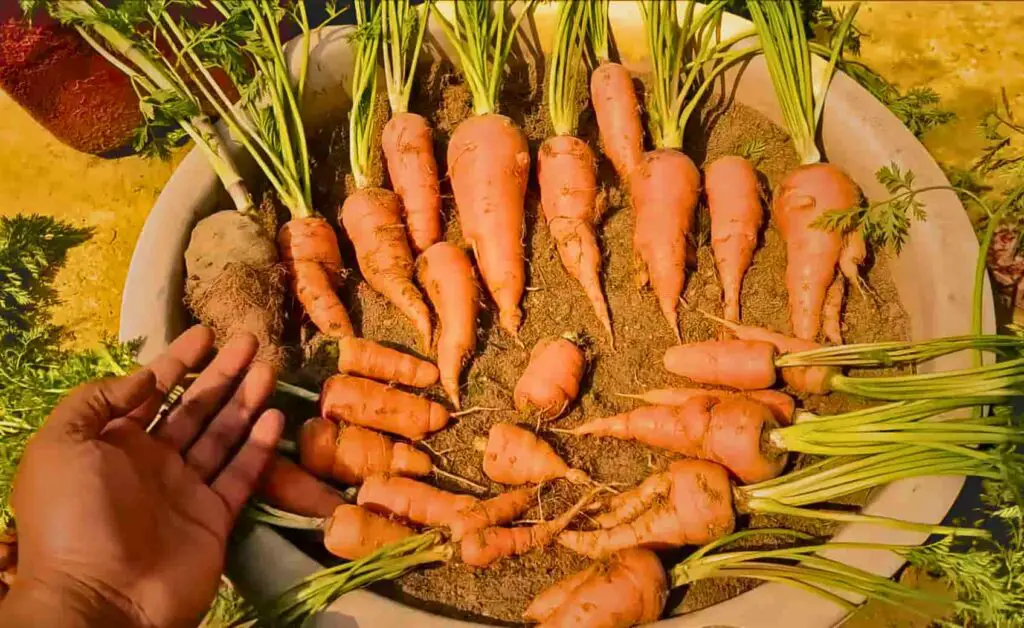
When it comes to making carrot puree for your little one, it’s important to choose the right kind of carrots. Here are a few things to consider:
- Opt for organic carrots whenever possible to minimize exposure to pesticides.
- Select carrots that are bright orange in colour without any blemishes or soft spots.
- Baby carrots can be a great option as they are naturally sweeter and smaller in size, making them easier to cook and blend.
Washing And Peeling The Carrots:
Before you start preparing the carrot puree, it’s crucial to ensure that the carrots are thoroughly washed and peeled to remove any dirt and bacteria. Here’s what you need to do:
- Rinse the carrots under cold running water, using a vegetable brush to gently scrub away any dirt.
- After washing, peel the carrots using a peeler or a sharp knife, making sure to remove the outer layer completely.
- It’s important to note that peeling the carrots helps in reducing the risk of choking and makes the puree smoother.
Cooking Methods For Carrot Puree:
There are a few different cooking methods you can choose from when preparing carrot puree. Here are some popular options:
- Steaming: Steaming the carrots helps retain their nutrients while making them soft and easily blendable. Simply place the peeled and sliced carrots in a steamer basket over simmering water and cook until tender.
- Boiling: This is another simple and quick cooking method. Add the peeled and sliced carrots to a pot of boiling water and cook until they are easily pierced with a fork.
- Roasting: Roasting the carrots can enhance their natural sweetness. Preheat your oven to 400°F (200°C), toss the peeled and sliced carrots with a little olive oil, and roast until they are fork-tender and slightly caramelized.
Blending Or Mashing The Carrots:
Once the carrots are cooked and tender, it’s time to transform them into a smooth puree. Here are a couple of methods to choose from:
- Blender: Transfer the cooked carrots to a blender or food processor and blend until smooth. You may need to add a small amount of water or breast milk/formula to achieve the desired consistency.
- Hand mashing: If you prefer a slightly chunkier texture, you can use a fork or potato masher to mash the cooked carrots until they reach the desired consistency.
Remember to let the puree cool down before serving it to your baby. You can store any leftovers in small airtight containers or ice cube trays in the freezer for future use.
Preparing carrot puree for your 6-month-old baby is a simple and nutritious way to introduce them to the world of solid foods. By following these steps, you’ll be able to provide your little one with a wholesome meal that’s full of vitamins and delicious flavour.
Introducing Carrot Puree In Baby’s Diet
Starting solid foods is a significant milestone for your little one. Introducing carrot puree into your baby’s diet is an excellent choice, as carrots are packed with essential vitamins and minerals. Here’s what you need to know when incorporating carrot puree into your baby’s meals:
Signs Of Readiness For Solid Foods:
- Your baby can sit up with support and hold their head steady.
- They show an interest in what you’re eating and try to grab food from your plate.
- The disappearance of the tongue-thrust reflex means your baby no longer pushes food out with their tongue.
- Your little one has doubled their birth weight.
Start With Small Amounts:
- Begin by offering your baby a small spoonful of carrot puree after their usual milk feeding.
- Observe their reaction and look for any signs of allergies or intolerance.
- Gradually increase the amount of carrot puree as your baby becomes more comfortable with solid foods.
Mixing Carrot Puree With Other Foods:
- Once your baby is accustomed to the taste of carrot puree, you can start mixing it with other pureed fruits or vegetables.
- Consider combining carrot puree with sweet potato, apple, or butternut squash for added variety and flavours.
- Be cautious and introduce new ingredients one at a time to monitor for any potential allergies.
Gradually Increasing The Texture:
- As your baby gets older and more experienced with solid foods, you can increase the texture of the carrot puree.
- Begin by slightly thickening the puree by adding mashed banana or avocado.
- Eventually, you can introduce small soft chunks of cooked carrots to promote chewing and the development of oral motor skills.
Remember to always consult with your paediatrician before introducing any new foods to your baby’s diet. With proper preparation and attention to your baby’s cues, introducing carrot puree can be a delightful and nutritious addition to their meals. Enjoy this exciting stage of your baby’s feeding journey!
Safety Precautions For Feeding Carrot Puree To Babies
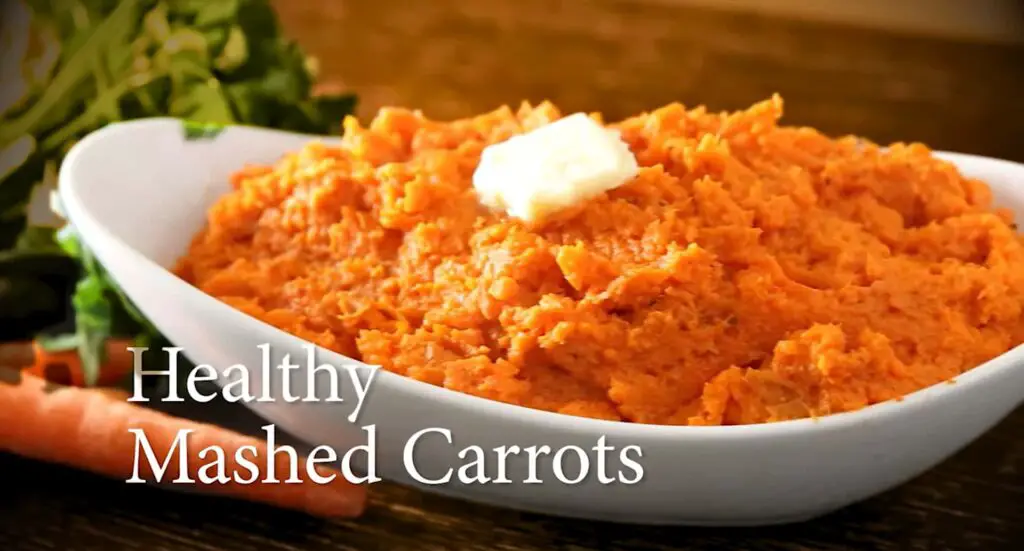
Discover essential safety precautions when introducing carrot puree to your 6-month-old baby. Ensure their well-being by following expert guidance and taking appropriate measures to make feeding a safe and enjoyable experience.
Feeding your 6-month-old baby carrot puree can be an exciting milestone in their journey of introducing solid foods. However, it is crucial to prioritize safety precautions to ensure your little one enjoys this new taste while staying healthy and protected.
In this section, we will discuss the essential safety measures to consider when feeding carrot puree to your baby.
Proper Food Hygiene Practices:
- Wash your hands thoroughly with soap and warm water before handling any ingredients or preparing the carrot puree.
- Ensure that the cooking utensils, cutting board, blender, or food processor are sanitized and clean.
- Use fresh, organic carrots to make the puree, handling them with care. Make sure there are no signs of spoilage or damage.
- Peel and thoroughly wash the carrots to remove any dirt or impurities before cooking them.
- Once cooked, allow the carrot puree to cool down completely before feeding it to your baby.
Allergies And Potential Risks:
- Introduce carrots as a standalone ingredient, without combining them with other new foods, to easily identify any allergic reactions.
- Monitor your baby closely during and after feeding carrot puree for any signs of allergies such as skin rashes, vomiting, or difficulty breathing.
- If your baby has previously shown allergic reactions to other foods, consult with their paediatrician before introducing carrot puree.
- Delay introducing carrot puree if your baby has a family history of allergies to reduce the risk of potential allergic reactions.
Monitoring For Any Adverse Reactions:
- Start by offering a small amount of carrot puree to assess your baby’s tolerance and response.
- Observe your baby’s behaviour, digestive system, and any physical changes after feeding carrot puree.
- Look for signs of discomfort, digestive issues, or abnormal reactions that may indicate an adverse response.
- In case of any adverse reactions, stop feeding carrot puree immediately and consult with your baby’s paediatrician.
By following these safety precautions, you can introduce carrot puree to your 6-month-old baby with confidence. Remember, always prioritize your baby’s well-being and consult with a healthcare professional for any concerns or questions regarding their diet. Happy feeding!
Fun And Healthy Recipes Using Carrot Puree
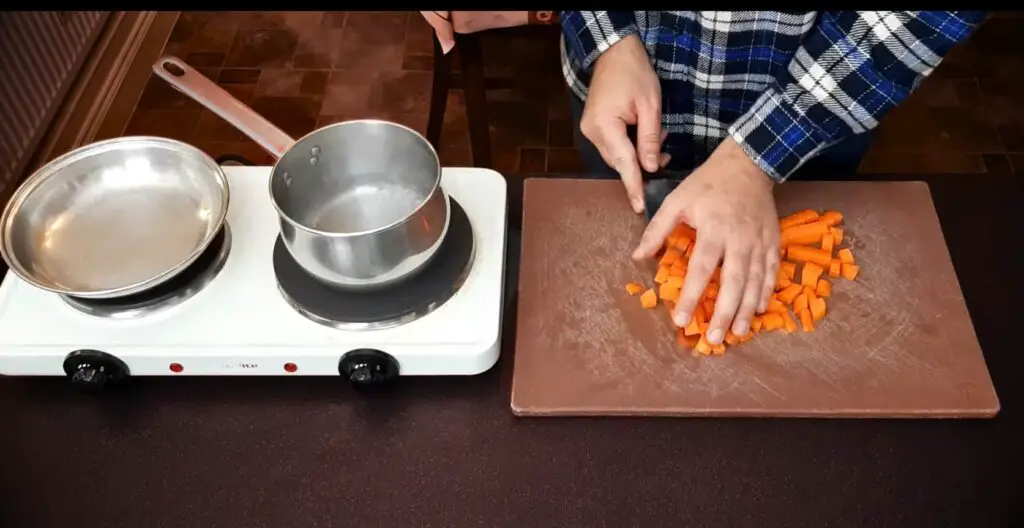
Discover fun and healthy recipes for your 6-month-old baby using carrot puree. These delicious and nutritious dishes will introduce your little one to the wonderful world of flavours while promoting their overall well-being.
Are you looking for fun and healthy recipe ideas to introduce your 6-month-old baby to solid foods? Look no further! We have some delicious and nutritious recipes using carrot puree that your little one will surely enjoy. Carrots are rich in vitamins and minerals, making them an excellent choice for your baby’s early food journey.
Let’s explore three exciting combinations using carrot puree.
Carrot Puree With Apple:
- Apple and carrot puree is a delightful combination that offers a burst of flavours your baby will love.
- Here’s how you can prepare this recipe:
- Peel and dice one apple and two medium-sized carrots.
- Steam or boil the apples and carrots until they become soft and tender.
- Once cooked, blend the fruits and vegetables together until you achieve a smooth and creamy consistency.
- Serve the carrot and apple puree to your baby, ensuring it’s at a suitable temperature for their delicate palate.
Carrot Puree With Sweet Potato:
- Combining carrot puree with sweet potato creates a naturally sweet and creamy blend that your baby will find irresistible.
- Here’s a step-by-step guide to preparing this wholesome recipe:
- Peel and chop two small sweet potatoes and three carrots.
- Steam or boil the sweet potatoes and carrots until they are soft and easily mashed.
- Using a blender or food processor, puree the vegetables together until smooth and lump-free.
- Allow the mixture to cool before serving it to your baby.
Carrot Puree With Rice Cereal:
- Mixing carrot puree with rice cereal adds a different texture to your baby’s meal while maintaining the nutritional value of both ingredients.
Here’s how you can create this textured combination:
- Cook half a cup of rice cereal according to the package instructions.
- Puree two carrots until smooth and creamy.
- Once the rice cereal is cooked and cooled, mix in the carrot puree.
- Stir well to ensure the flavours are evenly distributed.
- Feed this delightful and wholesome mixture to your baby with a spoon.
These three carrot puree recipes provide a range of flavours and textures to entice your 6-month-old baby’s taste buds. Remember to introduce one new food at a time and observe your baby’s reaction to identify any potential allergies or sensitivities.
Enjoy this exciting phase of introducing solids to your little one!
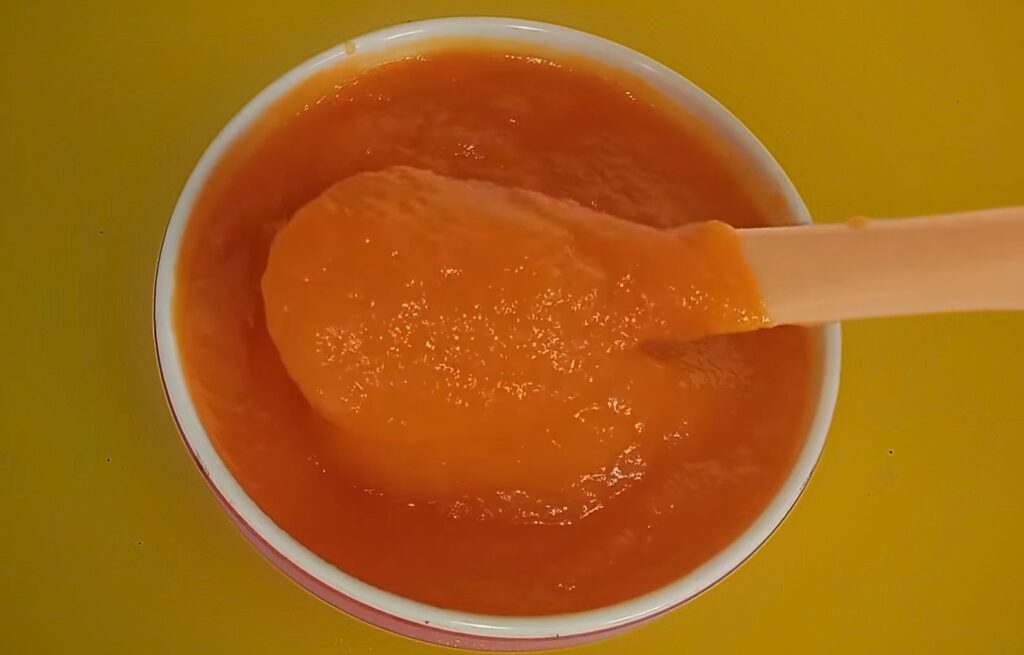
Tips For Storing And Freezing Carrot Puree
Discover helpful tips for storing and freezing carrot puree to ensure a convenient and nutritious option for your six-month-old baby. Keep the puree in airtight containers, label and date them, and store them in the freezer for up to six months.
Enjoy the benefits of easy meal preparation and a well-rounded diet for your little one.
Preparing homemade carrot puree for your 6-month-old baby is a wonderful way to introduce nutritious and flavorful food into their diet. To make mealtime easier, you can store and freeze carrot puree in advance. Follow these tips for storing and freezing carrot puree, ensuring that it remains fresh and delicious for your little one.
Appropriate Containers For Storage:
- Choose BPA-free airtight containers or silicone ice cube trays for storing carrot puree.
- Use small individual portions in ice cube trays for easy serving and thawing.
- Mason jars or baby food storage pouches are also suitable options for larger quantities.
Proper Labeling And Organization:
- Always label the containers with the date of preparation to keep track of freshness.
- Place the containers at the back of the fridge or freezer, following the first-in-first-out principle.
- Organize the stored carrot puree neatly to prevent confusion and wastage.
Steps For Freezing And Thawing Carrot Puree:
- Allow the freshly made carrot puree to cool down completely before freezing it.
- Pour the puree into the chosen containers, leaving a small space for expansion during freezing.
- Seal the containers tightly to prevent any air from getting in.
- If using ice cube trays, cover them with plastic wrap and secure them with a rubber band.
- Place the containers or ice cube trays in the freezer, ensuring they are stable and won’t topple.
- Leave the puree to freeze completely which usually takes 4-6 hours.
- Once frozen, pop the carrot puree cubes out of the trays and transfer them to freezer-safe bags or containers if needed.
- For thawing, simply take out the desired amount of frozen carrot puree cubes and thaw them in the refrigerator overnight.
- Alternatively, you can thaw frozen carrot puree cubes quickly by placing them in a microwave-safe dish and heating them in short intervals, stirring occasionally.
- Once thawed, make sure to warm the carrot puree to an appropriate temperature for your baby before serving.
Properly storing and freezing carrot puree allows you to conveniently provide your 6-month-old with homemade meals that are nutritious, delicious, and easy to prepare. By following these tips, you can ensure that your baby always has a healthy supply of carrot puree available for their meals.
Frequently Asked Questions For Carrot Puree For 6 Month Baby
Can I Feed Carrot Puree To My 6-Month-Old Baby?
Yes, carrot puree is safe and nutritious for a 6-month-old baby. It is packed with essential vitamins and minerals that support healthy growth and development. Start with small amounts and gradually increase as your baby gets used to new tastes and textures.
Can I Freeze Carrot Puree For Later Use?
Yes, you can freeze carrot puree for later use. Once the puree has cooled, transfer it to ice cube trays or small airtight containers. Label them with the date and freeze. Thaw only the amount needed for each feeding by placing it in the refrigerator overnight or using a defrost setting on your microwave.
Are There Any Health Benefits Of Carrot Puree For Babies?
Absolutely! Carrot puree is an excellent source of vitamin A, which supports healthy vision, immune function, and cell growth. It also contains fiber, potassium, and antioxidants. Regular consumption of carrot puree can help improve digestion, boost immunity, and support overall growth and development in babies.
Conclusion
To sum up, introducing carrot puree into your baby’s diet at six months can be a healthy choice that provides a range of essential nutrients. Carrots are packed with vitamins and minerals, including vitamin A, which is crucial for good vision and immune function.
The smooth texture of carrot puree makes it ideal for babies who are starting to transition into solid foods. Plus, its naturally sweet taste is often well-received by little ones. It’s important to remember to introduce new foods gradually and watch for any signs of allergies or sensitivities.
With a few simple steps, you can easily prepare homemade carrot puree for your baby and ensure that they are getting all the goodness this vibrant vegetable has to offer. So, give it a try and watch your little one enjoy their nutritious carrot puree!

